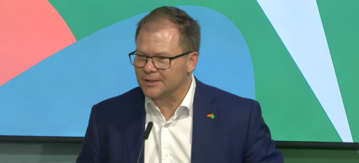At the Side Event "Industry on the road towards 2050 – The Climate Club as an accelerator for the industry transition"
– Check against delivery –
Ladies and gentlemen,
I am delighted to see you all here. Today, we want to present the Climate Club’s achievements in 2025 and look ahead to the future – to what we want to tackle with our partners.
We set up the Climate Club in 2023. It is a high-level intergovernmental forum to accelerate industry decarbonisation. We now have 47 members from all over the world. I would like to welcome Mexico as our newest member. We are delighted to have another important country on board. This will strengthen our joint efforts to achieve green industrialisation.
The Climate Club’s structure is unique. The Global South and North collaborate closely – at both political and expert level.
Above all, this will enable us to find common solutions more quickly for carbon-free or low-carbon production for cement and steel. In other words, for basic materials that are crucial for our economies but linked to high emissions. We also learn more about our different interests and concerns, and take them into account.
Industry transition is key to climate action. And by the same token, climate-friendly transition is key to competitive industry. It drives innovation, attracts investment and creates future-proof jobs. This transition is also a de-risking strategy. Relying on renewable energy, green hydrogen and recyclable plastic or metal makes industry less dependent on raw materials, and less vulnerable in geopolitically difficult times.
We all know that companies can make a compelling business case for climate-friendly production if the conditions are right. International cooperation is crucial because many emission-intensive industrial products are traded on global markets. This is exactly why we have the Climate Club.
Let me highlight, what we have achieved together over the past year.
First: at the start of COP30, the Climate Club members published a joint global pledge to grow near-zero and low-emissions steel and cement markets. The goal is to increase the global market share of green steel and cement through national policies and international cooperation. We are working towards potentially setting a quantitative target for green steel and cement by COP31. This is a good example of how the Climate Club advances lead markets and strengthens the business case for climate-friendly production. We are tackling one of the key challenges: namely, to create demand for climate-friendly industrial products.
Second: we drew up joint principles for action to address carbon leakage and other spillovers this year under the leadership of the UK and Türkiye. They were presented at the New York Climate Week in September.
Third: we are supporting our partners in the Global South with their transition – that is where most industrial investments will be made in future. With the Global Matchmaking Platform we are helping emerging economies and developing countries gain access to technical and financial support for climate-friendly industrial development.
In the past year alone, we supported nine countries and 20 project matches have already been identified.
It is also clear that we are just beginning. Germany, the UK and the Climate Investment Funds sent an important signal last year at COP29 with their joint pledge of 1.3 billion US dollars for the support of emerging markets and developing countries. We further developed this in the last year together with a wide range of important actors. Today, we can present our Joint Statement and Roadmap on International Assistance and Partnerships for Green Industry Transitions.
I am very pleased that so many key actors are pulling together: signatories include emerging economies and developing countries like Brazil, Indonesia and Kenya. We are also tackling this issue in partnership with foundations like the Industry Transition Accelerator and organisations like the Green Climate Fund, the Climate Investment Funds and IRENA.
And we can announce another joint outcome: Germany, the UK and the Global Industry Hub plan to contribute 30 million euros to the Industry Decarbonization Hub Accelerator. This will enable targeted funding for projects to reduce industrial emissions in individual countries, making them bankable.
The Climate Club is also about bringing new ideas from practice and science into the debate. I am very pleased that the report “Industry on the road towards 2050” is being launched and presented today. Thank you to everyone who contributed. Your suggestions will inspire us for the future work of the Climate Club.
I would like to once again thank our Co-Chair Chile, the Climate Club Secretariat at the IEA and the OECD and other key partners for the excellent cooperation.
I look forward to continuing our joint efforts to find future-proof solutions for our industries. Thank you for the cooperation, and I wish everyone interesting discussions.

